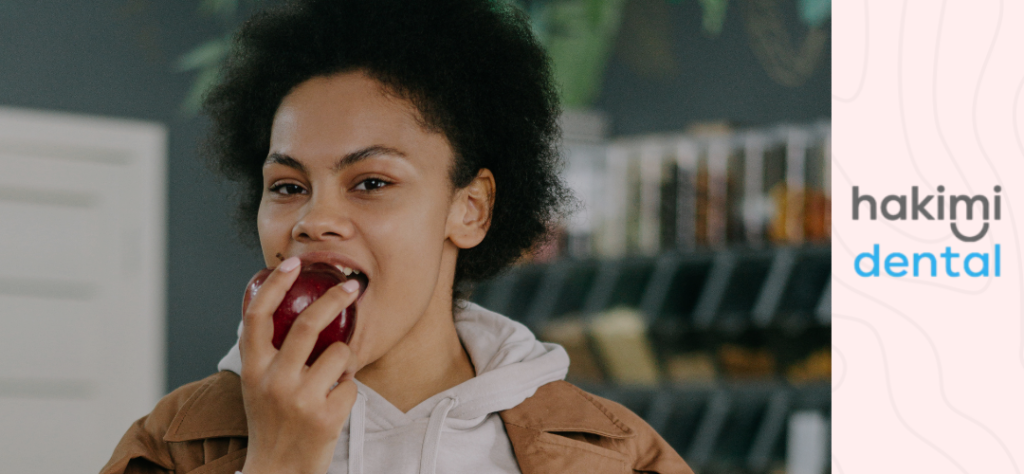If you’re keen to keep your smile bright and your gums healthy, you’ve landed in just the right place.
In this blog, we’re talking about something we all do every day—eating—and how it affects our dental health. We’ll look at the best foods that are good for your teeth and gums and how you can fit them into your diet effortlessly.

Why your diet matters for oral health
Often, we focus primarily on brushing, flossing, and routine dental check-ups when we think about dental care. However, the foods you eat can also have a significant impact on your oral health. Certain foods can lead to plaque and cavities, while others can protect and repair your teeth. By making informed dietary choices, you can naturally enhance the health of your mouth.
The impact of food on dental health
Eating the right foods can help in several ways. Some foods have natural abrasive qualities that help in cleaning the teeth, others provide essential nutrients that strengthen the enamel, and some even change the environment in your mouth, making it less hospitable for harmful bacteria.
Top foods that benefit oral health
Let’s get into the specifics of what foods you should eat to promote dental health:
Dairy products
Dairy items such as cheese, yoghurt, and milk are excellent for dental health. They’re loaded with calcium and phosphates, vital nutrients that strengthen both bones and teeth. These nutrients also help balance the pH levels in your mouth, reducing the acidic conditions that can erode enamel.
Crunchy fruits and vegetables
Crunchy fruits and vegetables like apples, carrots, and celery are beneficial for oral health. Eating these can help clean your teeth naturally. As you chew, they scrub away plaque and stimulate saliva production. Increased saliva is important because it helps wash away food remnants and neutralises harmful acids.
Leafy greens
Leafy greens, including spinach, kale, and Swiss chard, are nutrient powerhouses, rich in calcium, vitamins, and minerals crucial for maintaining healthy teeth and gums. They are especially good for gum health because of their high vitamin C content, which can reduce inflammation and help produce collagen, a protein vital for maintaining gum structure.
Nuts and seeds
Almonds, walnuts, and sunflower seeds make great snacks that are not only healthy but also good for your teeth. They provide essential minerals and proteins and have low carbohydrate content. This is beneficial because it means they don’t supply the sugars that feed the bacteria in your mouth, which can lead to dental issues.
Teas
Both green and black teas are rich in polyphenols, natural compounds that can slow the growth of bacteria responsible for cavities and gum disease. Additionally, these teas are sources of fluoride, a mineral that strengthens tooth enamel and helps prevent decay.
How to incorporate teeth-friendly foods into your diet
Integrating these foods into your daily routine is easier than you might think.
Here are some practical tips:
Breakfast: start your day right
Begin your morning with choices that strengthen your teeth and set a positive tone for the day. A yoghurt parfait is an excellent option; layer plain yoghurt with fresh berries and a sprinkle of nuts or granola for a crunch. The yoghurt provides calcium and probiotics, which are great for your teeth and gums. Alternatively, a slice of cheese on whole grain bread offers a satisfying mix of protein and fibre, helping to kickstart saliva production, which is crucial for protecting your enamel throughout the day.
Snacking: smart choices
When it comes to snacking, it’s easy to fall into the trap of reaching for sugary or starchy snacks like crisps or sweets. Instead, opt for crunchy vegetables such as carrot sticks, bell pepper slices, or cucumber. These vegetables scrape plaque as you chew and boost your vitamin intake without risking your teeth to sugars. Nuts like almonds or walnuts are another great option, providing essential nutrients and proteins while being low in carbohydrates, which means they don’t feed the harmful bacteria in your mouth.
Meals: nutrient-rich
Incorporate a serving of leafy greens into your lunch or dinner every day. Leafy greens like spinach, kale, and Swiss chard are loaded with calcium and beneficial vitamins that support oral health. They can easily be added to salads for a crisp texture, blended into smoothies for a nutrient boost, or lightly sautéed as a delicious side dish. Not only do they contribute to your overall nutrition, but the act of chewing them also stimulates saliva production, which is beneficial for oral cleanliness.
Drinks: healthy hydration
Beverage choices play a significant role in oral health. Sugary drinks like soda and fruit juices can bathe your teeth in sugar and acids, leading to decay. Instead, choose unsweetened teas, which contain polyphenols that help reduce bacteria and decrease acid production. Green and black teas offer the added benefit of fluoride, which helps strengthen tooth enamel. Equally important is drinking plenty of water throughout the day. Water is essential for maintaining optimal saliva production and helps rinse away food particles and bacteria.
Conclusion
Understanding how diet impacts dental health can significantly enhance your approach to oral hygiene. By choosing the right foods for your teeth and gums, you can ensure a healthier mouth and a brighter smile. Remember, while your diet is crucial, regular dental check-ups and proper oral hygiene practices are equally important. Keep up with your dentist’s appointments and follow their guidance to keep your smile at its best!
FAQs
Foods that are high in calcium, phosphorus, and vitamins help improve teeth health. These include dairy products like milk, cheese, and yoghurt, crunchy vegetables like carrots and celery, and leafy greens such as spinach and kale.
To strengthen your teeth, consume foods rich in calcium and phosphorus, such as dairy products and nuts. Additionally, maintain a regular oral hygiene routine including brushing twice a day with fluoride toothpaste, flossing daily, and visiting the dentist regularly.
Apples are often considered the best fruit for teeth. They have a high water content that stimulates saliva production, which helps to rinse away bacteria and food particles. Additionally, the fibrous texture of apples helps to clean teeth and gums.
- Brush twice a day with fluoride toothpaste.
- Floss daily to remove plaque from between your teeth.
- Visit your dentist regularly for check-ups and cleanings.
- Avoid sugary snacks and drinks.
- Drink plenty of water throughout the day.
- Eat a balanced diet rich in vitamins and minerals.
- Use an antimicrobial mouthwash if recommended by your dentist.
- Avoid smoking and tobacco products.
- Use a straw when drinking acidic beverages to minimise contact with your teeth.
- Chew sugar-free gum to stimulate saliva production.
Bananas are good for your teeth as they contain potassium, magnesium, and manganese which strengthen the enamel. However, they are also high in sugars, so it’s best to brush your teeth after eating bananas to prevent tooth decay.
- Cheese
- Yogurt
- Leafy greens
- Apples
- Almonds
